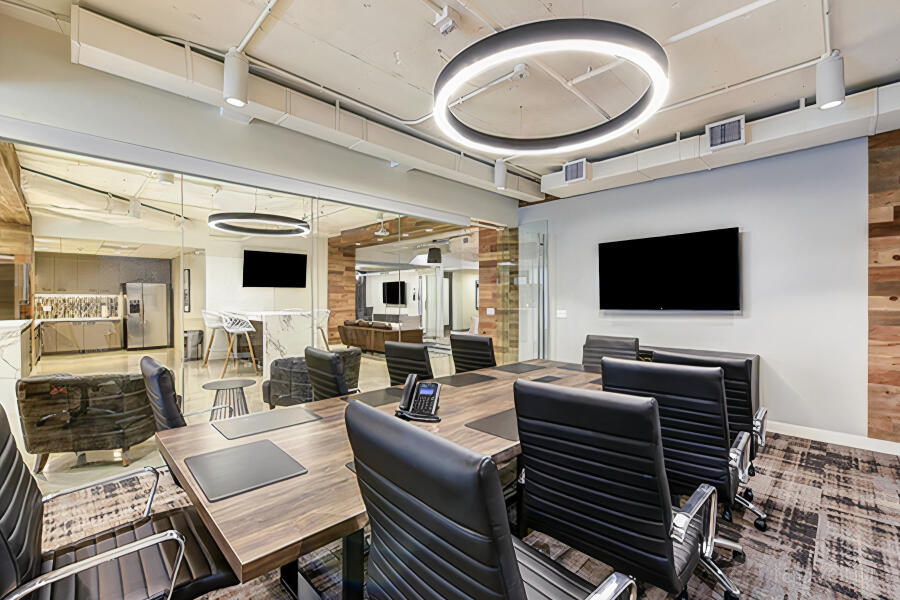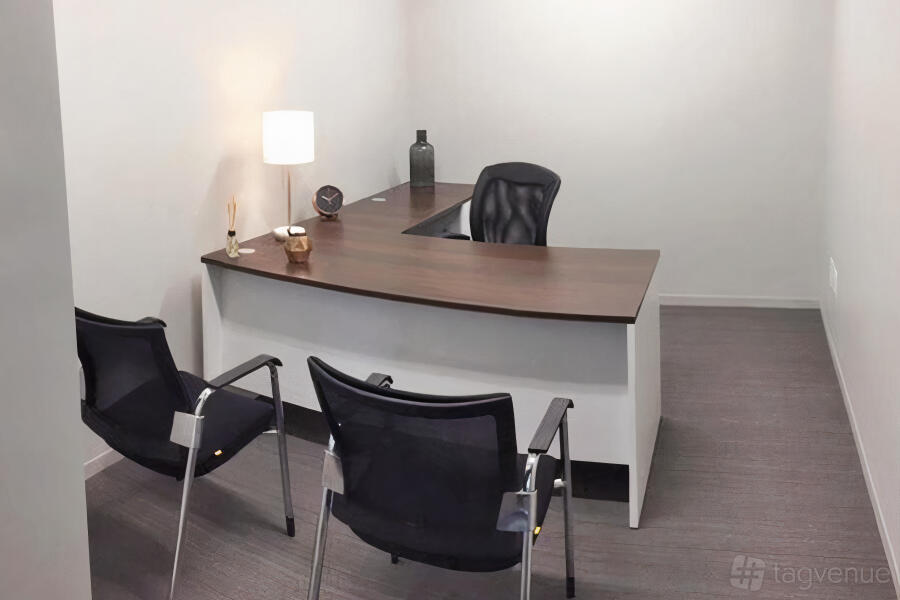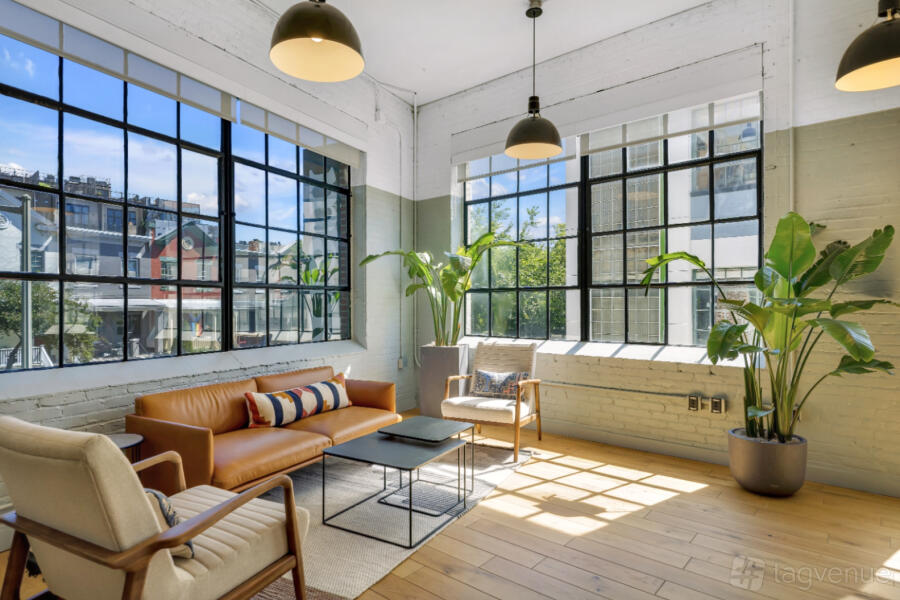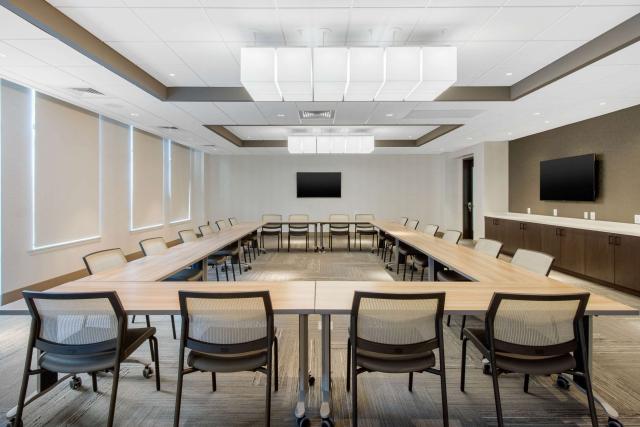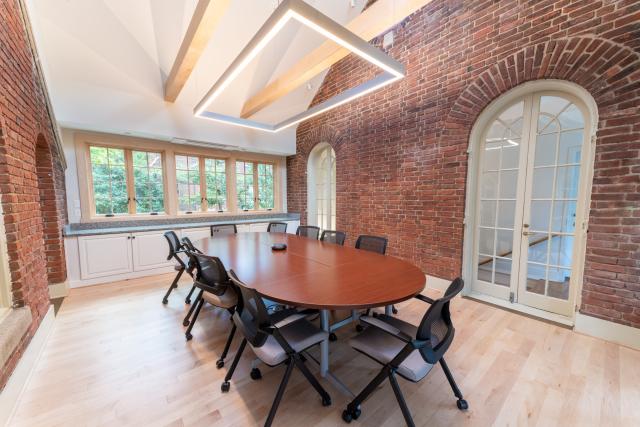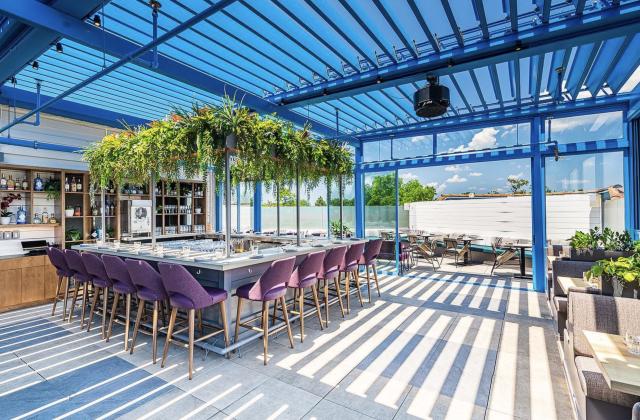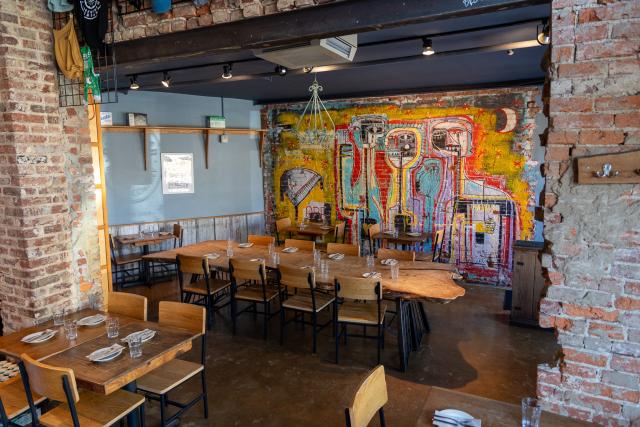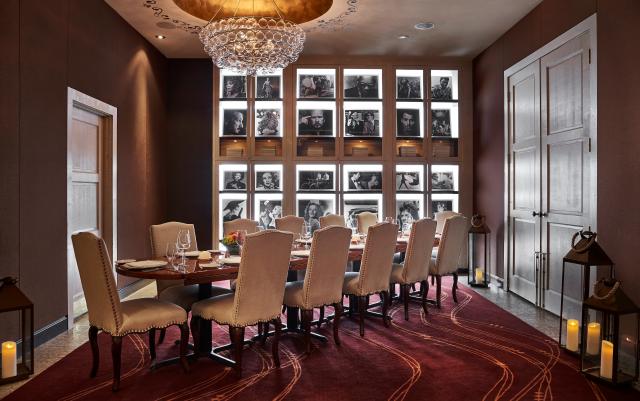Top Meeting Spaces in Washington, DC
There’s no place like Washington, D.C., a city known for its wheeling and dealing. Are you trying to get hold of the American Dream? Start by finding the right meeting spaces to impress your clients or future investors. Whether it’s for your first sales pitch or product launch, you can find several reasonable spaces for hosting your meeting if you know where to look! And since we’re talking about finding the best meeting spot for your upcoming event, why not use some help from Tagvenue and browse through our list of the top meeting rooms in D.C.?
-
Medium Conference Room
10 guestsPremier Workspaces - 2001 L STREETNorthwest, Washington, DCThen look no further! We offer medium conference room that can fit up to 10 people, with access to a lounge and kitchen. Our spaces are perfect for meetings, brainstorms, and creating a creative atmosphere.from $55
hire fee / per hour -
Large Conference Room
10 guestsPremier Workspaces - 2001 L STREETNorthwest, Washington, DCAre you looking for a premier workspace in Washington? Our large conference room is perfect for hosting meetings, brainstorms, and other business activities.from $75
hire fee / per hour -
Monument Meeting Room
22 guestsIntelligent OfficeNorthwest, Washington, DCThe Capital Medium Meeting Room will work well for meetings of up to 12 people. The elegant meeting room has all the modern amenities needed for a meeting, presentation, or workshop.from $110
hire fee / per hour -
Bridge Room
10 guestsFriends Meeting of WashingtonNorthwest, Washington, DC#Supervenue
SSteven B.
“An excellent venue that was easy to access. The attentive team helped set up Wifi and Zoom.”from $100
hire fee / per hour -
The Capital Meeting Room
12 guestsIntelligent OfficeNorthwest, Washington, DCProfessional presentation-ready meeting space can accommodate 12 guests. Equipped with complimentary dry-erase walls, flat-screen monitors, conference-ready phones, WiFi, and beverages.from $75
hire fee / per hour -
Smithsonian
70 guestsAdvantEdge WorkspacesNorthwest, Washington, DCAAdam A.
“Great location, space, and service from team.”from $325
hire fee / per hour -
The Potomac Meeting Room
6 guestsIntelligent OfficeNorthwest, Washington, DCYou can take advantage of dry-erase boards, flat-screen monitors, conference phones, WiFi, and refreshments on site. The space will work well for business meetings, talks, or workshops.from $65
hire fee / per hour -
The DuPont
10 guestsMetro Offices Dupont CircleNorthwest, Washington, DCLooking for a meeting room in the Dupont Circle area? This boardroom in Metro Offices provides a modern and professional setting for up to 10 people. It features swivel chairs, a sleek table, and amenities such as a TV screenfrom $60
hire fee / per hour -
Meeting Room
12 guestsHotel AKA Washington CircleNorthwest, Washington, DCThis modern meeting room, located in Hotel Aka Washington, accommodates up to 12 guests in a sleek, boardroom-style setting. It features contemporary art, comfortable swivel chairs, and a large presentation screen, idealfrom $500
hire fee / per day -
Day Office
3 guestsPremier Workspaces - 2001 L STREETNorthwest, Washington, DCHHaby B.
“Many thanks”from $35
hire fee / per hour -
Private Meeting Room I
10 guestsThe Mark at Manhattan LaundryNorthwest, Washington, DCPrivate Meeting Room I at The Mark, Manhattan Laundry offers a spacious and well-appointed setting for meetings, workshops, or collaborative sessions, with a capacity of up to 20 people.from $250
hire fee / per hour -
Duke
30 guestsViceroy WashingtonLogan Circle, Washington, DCLocated on the first floor flush with natural lighting, Duke features A/V ideal for meetings, and a side table ideal for coffee service for a small break setup.from $500
hire fee / per session
- 1
- 2
- 3
- 4
Capacity
Budget
Area type
Venue type
Catering and drinks
Accessibility features

FAQs about Top Meeting Spaces in Washington, DC
If you plan to indulge your guests in some good old history, rent a meeting space in Capitol Hill. Home to landmarks such as the Supreme Court and Capitol Building, this part of D.C. will captivate your guests with its upscale boardrooms and conference rooms. Hop to Connecticut Avenue near the metro station, where you can find many convenient meeting spaces. Meeting rooms in Logan Square are easily accessible through public transit meaning it won’t be an issue for your guests to get there on time. Plus, there are several eateries and bars in the area, making it a perfect meeting location for those all-day sessions. Mount Vernon Square is known as a commuter’s paradise where you can easily get to any meeting location through transit. It is also an ideal location for hosting a dinner at its numerous restaurants after the meeting.
Budget around $40-$70 per hour for affordable meeting spaces with 6 to 10 seating spaces. For larger meeting rooms, such as conference rooms, expect to pay around $2,000 per day.(All data from Tagvenue.)
If you’re interested in renting a meeting space in Downtown, Capitol Hill, or Federal Square, you’ll be glad to know that you can find several affordable meeting spaces in these hyped neighborhoods. You’ll effortlessly get your hands on many cheap meeting locations for under $100/hour. (All data from Tagvenue.)
Planning in advance is always advisable. The longer the notice period, the smoother the event will be. Generally, meeting spaces can accommodate you at short notice and will reply rapidly to your initial inquiry to assist you with the process. But we recommend booking a meeting space at least 2 months in advance if you’re holding a major event like a training session or talk.
You will usually be notified about the availability of on-site parking and nearby public parking when booking a meeting space in D.C. Most venues will have ample on-site parking. However, it’s better to play it safe and check the parking options in advance with the venue manager. Parking in D.C. can be expensive, so plan accordingly.
Your Guide to Renting Meeting Spaces in Washington, DC
DC is the land of entrepreneurship and business opportunities. Whether you're about to begin your business hustle in entertainment, politics, or tech, DC is the place to meet your future allies and investors. If you're just starting out, paying a lease can be pretty tough. You may consider working from home with a remote team. Yet, you'll still need to hold those official meetings every now and then, which is why you need to know how to negotiate your way through the maze of meeting venues! It can be a tricky process if you don't know what you're looking for. Undoubtedly, the feel and service provided by the DC meeting spaces can make or break the deal. We've come up with some valuable tips on hosting a meeting and narrowing down your meeting location search!
How to Select a Meeting Space in D.C.
Budget
We'll never get tired of mentioning the importance of setting a venue budget. If you want to splurge, don't hold back, but if you're a budding entrepreneur, chances are you'll want to save every penny for future investments. Renting an affordable meeting venue doesn't mean you're compromising on the service or acoustics, it only implies renting a space for fewer hours or ensuring that the venue provides additional amenities, such as on-site catering in the rental package. Check out their venue packages to save some bucks.
You won't have a hard time finding multiple reasonable small meeting rooms in D.C. If you're looking for a premium spot like a boardroom, you can further invest in the venue and take your attendees for lunch at a less expensive spot. Or maybe you feel like going all in and hiring a conference hall to host that Ted Talk. Whatever the needs of the event, make sure to set a reasonable budget that covers all aspects of the event. Online marketplaces provide you with no hidden extras and a quote upfront, making renting a meeting space so much easier. So try to use those when scouring for your next spot.
In-house Facilities
With great aspirations come bigger requirements. When technology prevails, having only a flipchart or projector in a meeting space is not acceptable. Meeting planners tend to think that amenities such as Wi-Fi access or LCD TVs are not vital for a meeting. Well, we're here to dispel that misconception. Since you will likely have some breaks during the meeting or may hold a brainstorming session, you need to keep your audience's interest at its peak. Whether it's by providing enough bandwidth for your attendees to access the internet to look up relevant information or having a heater or AC in your meeting room, these seemingly trivial elements of a venue can largely affect the perception of your attendees and your performance at the meeting.
You'd probably like to host a stress-free event where you don't need to worry about the audiovisual equipment being in place or your attendees not having Wi-Fi access. To avoid such uncertainties, it's best to inquire about the amenities of the meeting room with your venue manager. Remember to also consider disabled facilities if you haven't met your attendees prior to the meeting.
Venue Location
There's always an ideal meeting space with excellent accessibility in D.C. While it's not hard to commute using the metro or underground in the capital, you'll still want to ensure that the meeting space has adequate road and rail links for your guests to get there conveniently and on time. Steer clear of spots that are located on the outskirts unless most of your attendees are from there. The ideal meeting space will be located in a suitable location with great access to transportation but in a rather quiet area to not disrupt the event. If you pick a faraway location, expect attendance and participation to be on the lower side, and if your guests are traveling overseas for the sake of this meeting, check whether they'll have a direct flight from their countries. You wouldn't want your guests to be out of breath once they reach the meeting location!
Food and Drink Options
If you're holding a lengthy discussion, we recommend finding a meeting space that can accommodate your catering needs. Many meeting spaces will provide refreshments along with a menu that caters to specific dietary requirements. In-house catering is definitely a plus after a long meeting, as most people are likely to need a rest and head to their hotels and homes right after the event. For example, renting a meeting room at a restaurant and hotel is excellent as you won't have to worry about leasing another venue for the dinner. Consider having a buffet at the venue for your guests during lunchtime or offering some refreshments followed by a full-course dinner after the event.
Size of the Meeting Room
Size matters. One of the main things to consider when going on a venue hunt is the capacity of the meeting space. The preferred venue should suit your guest count so that the room isn't overcrowded. If you're holding a seminar and having more than 50 guests over, don't think about renting a micro meeting room. Your guests will surely feel uncomfortable and want to leave the event ASAP. Make sure that the meeting room features enough seating for your event. Consider renting a conference room or even a conference hall if you're anticipating a large number of participants. You also need to take the layout into account, along with other options such as breakout rooms, depending on the nature of your event. For instance, if you are having a one-on-one meeting, it's unnecessary to rent a full boardroom. Better keep it classy by holding it at a sophisticated and cozy meeting space, whereas for training sessions, you may want to hold the event at a space that allows you to have a classroom seating arrangement. So be careful not to compromise on the size for the price or decor of the meeting space.
If you need more help with meeting room layout, check out our Seating Arrangement Guide!
Entertainment Options
They say entertaining your partners is another way to seal the deal. You'll undoubtedly learn a few things about your counterparts if you take them out for a few shots or a slice of the best pizza in Capitol Hill. It's crucial to add some entertainment options that are in line with your brand's image. Once you're in a more relaxed environment at a restaurant or bar, your guests are likely to feel more comfortable with you and reciprocate your offers or ideas. This is an opportunity to learn more about each other and to actually use the occasion to shed some light on your business perspective. By providing both entertainment and backup information about your skills and brand values, you enhance the position of your company! Just make sure not to get drunk and stay professional, even in an informal set-up. When searching for a meeting venue, keep in mind to check the surroundings so you don't have to travel far for the post-meeting entertainment.
How to Host a Successful Meeting in Washington, DC
Now that you know how to select your next meeting spot, let's move to the essential stuff: meeting planning. So, how do you go about hosting a successful event in D.C.? Is it just the right visuals and content when presenting your company, or is it more about engaging your audience through conversations? Does it matter whether you start and finish on time, or is it irrelevant? With so many things to ponder, you might worry unnecessarily about the meeting. It's best not to overburden yourself, follow these guidelines and keep it simple.
Start and End the Meeting on Time
Never assume that your attendees' time is not precious. It's essential to pay attention to every element of your meeting and stick to your schedule. For instance, spend no more than 20 to 30 minutes on the presentation and avoid staring at the screen. It's important to engage your audience by interacting with them; otherwise, they may quickly get bored and leave the room or cut the meeting short (that's why it's important to check the meeting room layout and facilities before booking as they can help out with attendees' participation!). It's better to end slightly earlier than late. Do not drag on the meeting even though you may feel like you need more time to make your point. It's best to schedule another meeting rather than make the attendees feel like they've been taken hostage. It's also crucial to facilitate the meeting by encouraging your staff to participate in the conversation. Keep track of the time spent on all the things covered during the meeting.
Use a Template
You'll find numerous free templates for planning meetings on the internet. Once you prepare a meeting, use the template for the next sessions and adjust the goal and guest requirements accordingly. You won't need to plan everything from scratch, and it will be easier to organize the meeting.
Select the Attendees
A lot of time is wasted on unproductive meetings in the business world. People spend an average of 30 hours in pointless meetings every month. That time could be spent on more useful things, such as project planning. Make sure not to invite more people than needed just to fill up the room. If you need to keep the number of guests to 6, there's no need to invite more people who won't bring any value to the discussion. Invite individuals who can help the meeting achieve its initiatives and goals. Confused? Use the famous Bezos "two-pizza rule" and invite only the required number of people that two pizzas can feed!
Send the Invitations and Agenda
Okay, so you've already defined the purpose of the meeting and decided who should be invited to the event. Now it's time to set the agenda and send those invites. Your agenda should include the following elements:
- List of attendees and guest speakers (if any)
- Items of discussion
- A possible plan of action
- Amount of time allocated for every list item
- Date and time of the meeting
- Location of the meeting - it's important to provide the exact address
- Pre-work requirements, such as assignments or readings needed for the event
Once you've set the agenda, it will be much easier to keep the meeting organized and carry it smoothly. You'll also be better prepared to address every issue on the meeting agenda once it is set. As a rule of thumb, send the agenda at least a month before the event, particularly if your guests need to travel to the meeting location. This way, everyone will have sufficient time to prepare for the meeting.
Ideas to Try When Hosting a Meeting in D.C.
- Connect with your audience by telling a personal story. From Simon Sinek to Amy Cuddy, everyone uses this technique to get the attendees to relate to them.
- Engage your attendees throughout the meeting - ask questions and get to know them. Feedback and opinions can help you connect with them in no time.
- Use visuals. Listening to someone talk for an hour can get pretty dull. Try to jazz things up by utilizing visuals and videos when presenting. Make sure you can present what you've planned in the meeting room you've booked!
- If possible, ask attendees to help you with the content.
- Surprise your guests with a famous guest speaker.
- Hold a brainstorming session to encourage the attendees to come up with new ideas.
- Rent a unique meeting space that will keep the participants engaged. For example, instead of a regular conference room, rent a coworking space.
Once you've covered all the aspects of the meeting, it's essential to propose a follow-up or course of action on which your company will start working. You may also suggest another meeting to work on the proposal. Good luck sealing that deal!

